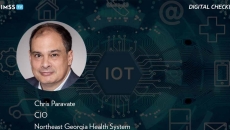Risk Management
Robert Booker, HITRUST's chief strategy officer, talks about the need to deploy artificial intelligence responsibly in healthcare as a part of risk management, and how his company's AI Risk Management Assessment helps companies grapple with rapidly evolving technology.
Aside from assisting in clinical matters, RTLS technology can allow leaders to track clinicians and respond quickly if they need help, said Northeast Georgia Health System CIO Chris Paravate.
Osara Health helps identify patients who would benefit by returning to work as rehabilitation, which also helps take away financial anxiety, says cofounder and CEO Dr. Raghav Murali-Ganesh.
Security risk trends include the move to mobile, a password-less future and outsourcing, says Joel Burleson-Davis, SVP Worldwide Engineering Cyber at Imprivata.
Nationwide policy of 12-month continuous eligibility would allow these programs to operate more like private coverage and Medicare, letter says.
DuploCloud account executives Joshua Mattson and Aaron Blackmon said protecting sensitive data is key to ensuring customers are secure when they work on the cloud.
HIMSS24
An AI prescribing tool does more than notify clinicians as it directly corrects the prescription if it detects a drug interaction and suggests prescription alternatives, says Emmanuel Bilbault, cofounder and CEO of POSOS.
Redundancy essentials are needed in every area, including vendors, as the Change attack showed the ancillary impact on healthcare, says Greg Surla, senior vice president and chief information security officer for FinThrive.
The company collects data that helps providers effectively manage the patient's pain during the recovery period, says Steven Walther, cofounder and CEO of Continuous Precision Medicine.
Payers need information for risk adjustment and providers need data to close gaps in care, says Piyush Khanna of Care First BCBS.









